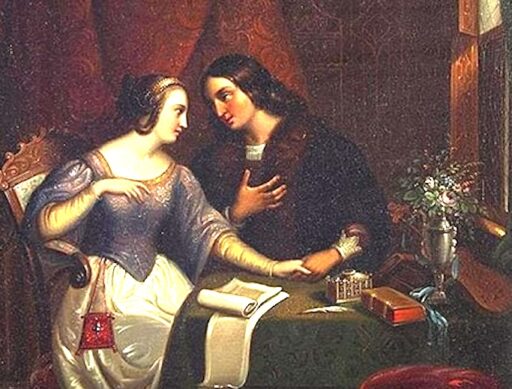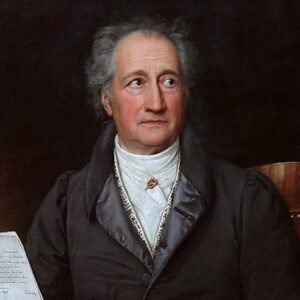It is one of the great love stories of history and therefore inherently interesting because who isn’t interested in a great love story? Actually, it is a terrible love story as well. That is also what makes it interesting. The love part of the love story only lasted about a year in the early twelfth century. That’s when the great philosopher Peter Abelard was in Paris teaching and making fools of the other great minds to be found in Paris at the time, at least as he tells it, but other sources seem to confirm that Abelard was indeed just sharper and more witty and quicker on his feet than anyone else, plus he was a damn good poet and wrote wonderful popular songs and was handsome as hell.
Also in Paris was Heloise, a somewhat mysterious person (from whence did she spring?) who managed to become a great Latinist and though a young woman perhaps in her late teens or early twenties was known to be amongst the more learned people of her age, especially when it came to those much revered classical authors like Cicero and Seneca and the like. Also she was beautiful of course. She had a force of presence and personality, it seems. Those are hard characteristics to convey without actually having met someone but the force and dignity of Heloise as a person come through in the letters she wrote, more on those in a minute.
Anyway, as many people know, Abelard and Heloise proceeded to fall in love. They came together ostensibly so that he could tutor her. But actually what happened was a torrid love affair. This affair was discovered and for various complicated reasons led to trouble, as can happen in the case of torrid love affairs. The trouble got so bad that Heloise’s family intervened, more specifically an uncle named Fulbert. The intervention came in the form of hiring a bunch of thugs to waylay Abelard and castrate him. End of love story. Sort of.
End of the physical and ‘torrid’ part of the love story, at least. But the reason that anyone knows anything about Abelard and Heloise today is that many years after the shocking events the two began a correspondence, she in the nunnery and he in the monastery. The letters are quite incredible, though at the same time frustrating. Moments of pure humanity burst through. Moments of passion, mostly from Heloise. Abelard is the more difficult case. It is easy to hate him in the letters. He’s become so cold and imperious. Also, after the first exchange of letters, the two decide to stay away from the painful remembrance of things past and to talk about topics like reforming the convent.
Not many people read those later letters, I would wager. But, in a sense, the only way really to get a feel for Abelard’s suffering, for the road he is trying to tread, is to read his insufferable sermonizing and advice. Because that is the struggle he took on. He wants to see the affair with Heloise and the terrible events it created as exactly that, terrible. He wants it to mean something in its terribleness. He wants it to have been a kind of trial sent by God to open both of their eyes and to have occasioned a true conversion. So he writes things like the following, “So intense were the fires of lust which bound me to you that I set those wretched, obscene pleasures, which we blush even to name, above God as above myself; nor would it seem that divine mercy could have taken action except by forbidding me these pleasures altogether, without future hope. And so it was wholly just, merciful…” and etc., etc. (Betty Radice translation in the Penguin Classics edition of the letters). He wants Heloise to be thankful that the ultimate tragedy of their affair could have turned them both toward true salvation.
Heloise, for her part, and to the complete surprise of most people reading the letters today, with their assumptions about medieval Christianity and their assumptions about what a nun and, at the time she wrote the letters, abbess of a convent would say, Heloise is having none of the salvation that Abelard thinks he has to offer. “God is my witness,” she writes (in a very elegant Latin indeed, it must be said), “that if Augustus, Emperor of the whole world, thought fit to honor me with marriage and conferred all the earth on me to possess for ever, it would be dearer and more honorable to me to be called not his Empress but your whore.” Boom. Notice please that she doesn’t just say “dearer,” she says “honorable.” He calls their pleasures obscene and not to be named. She calls them honorable.
She goes on! “Even during the celebration of the Mass, when our prayers should be purer, lewd visions of those pleasures take such a hold upon my unhappy soul that my thoughts are on their wantonness instead of on my prayers. I should be groaning over the sins I have committed, but I can only sigh for what I have lost.” She was an abbess, I repeat. And quite a good one, as the contemporary reports show. Much beloved. Gentle and pious in her actions and in her dealings with the nuns under her care. And yet, as she herself tells it a few sentences later in the same letter, “Men call me chaste; they do not know the hypocrite I am.”
And so the letters continue, Abelard trying to convince Heloise to surrender to God’s will and to see their shared fate as necessary and ultimately good, Heloise resisting this interpretation and suggesting, with every defiant word, that Abelard knows less than she about God, or the will to be found therein, or the odd and wandering path of salvation. At the end of the above quoted letter, as case in point, she writes, “In whatever corner of heaven God shall place me, it will be enough for me.” A corner of heaven it might be, but heaven nonetheless.
Morgan Meis has a PhD in Philosophy and is a founding member of Flux Factory, an arts collective in New York. He has written for n+1, The Believer, Harper’s Magazine, The Virginia Quarterly Review and is a contributor at The New Yorker. He won the Whiting Award for non-fiction in 2013. Morgan is also an editor at 3 Quarks Daily, and a winner of a Creative Capital | Warhol Foundation Arts Writers grant. A book of Morgan’s selected essays can be found here. His books from Slant are The Drunken Silenus. and The Fate of The Animals He can be reached at morganmeis@gmail.com.





